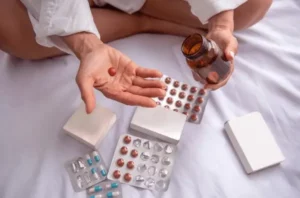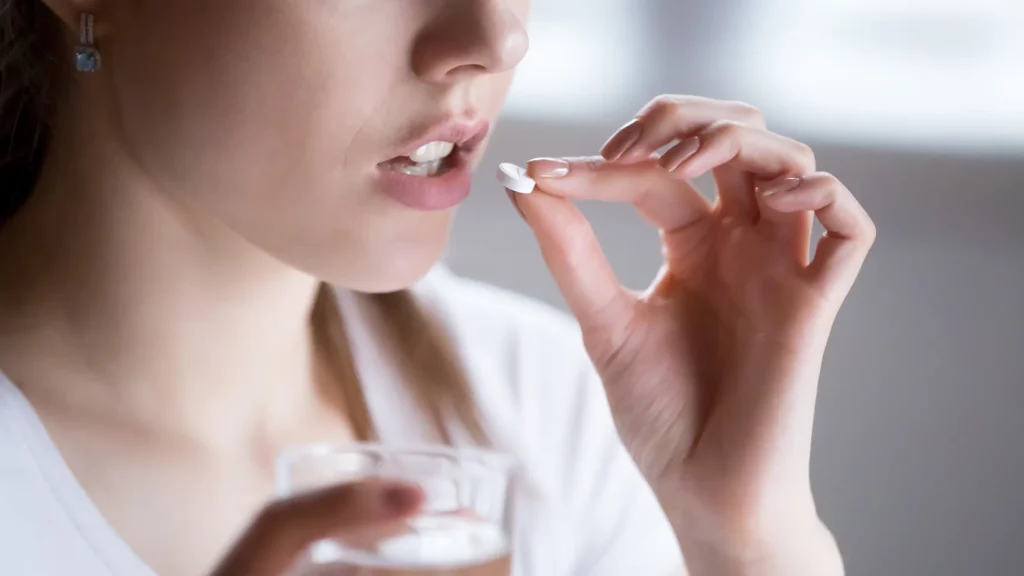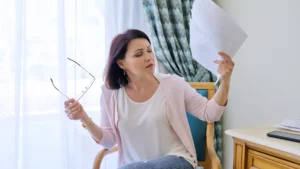Ever thought antidepressants were just for the mental health blues? Think again! These little wonders can do more than just lift your mood – they can tackle hot flashes during menopause. So, if those sudden waves of heat are making your day a rollercoaster, buckle up for a ride through the unexpected benefits of antidepressant medicine for hot flashes. Discover how these mood-lifting meds can be your go-to warriors against discomfort.
Ready to take on hot flashes? Dive into the world of antidepressants – their perks, what to watch out for, and find relief.
Contents
Different Types Of Antidepressants Use To Treat Hot Flash
 If you’re wondering how antidepressants can be the superheroes in your battle against hot flashes, it’s time to understand the different types in their arsenal. Let’s break it down:
If you’re wondering how antidepressants can be the superheroes in your battle against hot flashes, it’s time to understand the different types in their arsenal. Let’s break it down:
- SSRIs (Selective Serotonin Reuptake Inhibitors)
SSRIs, like fluoxetine and paroxetine, work by increasing serotonin levels in the brain. This boost in serotonin helps regulate mood and, surprisingly, plays a crucial role in managing the frequency and intensity of hot flashes.
- SNRIs (Serotonin-Norepinephrine Reuptake Inhibitors)
Think of SNRIs, such as venlafaxine and duloxetine, as double agents. They not only increase serotonin but also norepinephrine levels. This dual action can be particularly effective in reducing hot flashes and improving overall well-being.
- Tricyclic Antidepressants
Older but still mighty, tricyclic antidepressants like amitriptyline influence neurotransmitters in the brain. By doing so, they contribute to the regulation of hot flashes, offering a unique approach to managing these bothersome symptoms.
Understanding these distinct classes of antidepressants is like getting to know the characters in a superhero team – each has its strengths and unique abilities.
Some Antidepressant Medicine For Hot Flashes!

When it comes to fighting off hot flashes, not all antidepressants are created equal. Let’s explore some of the standout players in this game, each with its own unique abilities:
Brisdelle (Low-Dose Paroxetine)
Brisdelle is the only nonhormone treatment for hot flashes approved by the U.S. Food and Drug Administration. A low-dose form of paroxetine, it’s specifically designed to target and alleviate those bothersome heat waves.
Venlafaxine (Effexor XR)
Effexor XR steps in with its mood-boosting powers and plays a role in reducing the frequency and intensity of hot flashes. A versatile member of the antidepressant squad, it’s known for its effectiveness.
Paroxetine (Paxil, Pexeva)
In addition to Brisdelle, the regular forms of paroxetine, namely Paxil and Pexeva, join the fight. These antidepressants contribute to managing hot flashes, offering relief and restoring a sense of balance.
Citalopram (Celexa) and Escitalopram (Lexapro)
Meet the dynamic duo of Celexa and Lexapro. These antidepressants, part of the selective serotonin reuptake inhibitor (SSRI) family, work by increasing serotonin levels, contributing to the regulation of mood and hot flashes.
While these medications may not be as potent as hormone therapy for severe hot flashes, they become superheroes for women who can’t use hormones. But that’s not all – there’s a league of other prescription antidepressant medicines ready to join the fight:
Other Hot Flash Allies
- Gabapentin (Neurontin, Gralise, others): Moderately effective in reducing hot flashes, this anti-seizure medication adds another layer to the battle against heat waves.
- Pregabalin (Lyrica): Another anti-seizure medication that brings its effectiveness to the table, helping in the reduction of hot flashes.
- Clonidine (Catapres, Kapvay, others): Originally designed for high blood pressure, clonidine steps into the scene, offering relief from hot flashes in pill or patch form.
- Fezolinetant (Veozah): Veozah is a non-hormonal medicine specially crafted to tackle menopause hot flashes. By blocking a brain pathway that regulates body temperature, it offers daily relief in the form of a simple pill.
These antidepressant medicines form a powerful lineup, each contributing to the mission of making hot flashes a thing of the past. Whether it’s Brisdelle, Effexor XR, or the others on the team, these solutions aim to cool down those unexpected heat waves and restore comfort to your daily life.
Benefits of Using Antidepressants for Hot Flashes
 Thinking about using antidepressants to tackle hot flashes? Here’s a simple breakdown of why it could be a good idea:
Thinking about using antidepressants to tackle hot flashes? Here’s a simple breakdown of why it could be a good idea:
- Antidepressants, like SSRIs and SNRIs, can make those sudden hot flashes happen less often and be less intense. That means more comfort in your daily life.
- Besides helping with hot flashes, antidepressants can also boost your mood. Many people feel better overall when they take these meds.
- No more nights interrupted by hot flashes. Antidepressants can improve your sleep, helping you wake up feeling more rested.
- Your doctor plans the treatment based on your health and symptoms. It’s like a personalized plan to make sure it works best for you.
- Antidepressants don’t just focus on the hot flashes. They also help with how you feel mentally, creating a sense of balance and comfort.
- Antidepressants don’t just work for a short time. They keep providing benefits over a long period, making sure you feel good consistently.
- If you can’t use hormone therapy, antidepressants are a good alternative. They give relief without changing your hormones.
- People have different experiences with antidepressants. Real stories show that it can make a positive change that fits your needs.
- Using antidepressants for hot flashes makes your life better. They help with symptoms, boost your mood, and make you feel better overall.
So, these reasons might just make your perspective fo fusing antidepressants for hot flashes, your days more comfortable and your life better.
Is It Safe To Take These Antidepressant Medicines?
When it comes to considering antidepressants for managing menopause symptoms, safety is a top concern. Let’s delve into the nuances:
Most antidepressants used to combat hot flashes and night sweats during menopause fall under the category of “off-label use.” This means the manufacturers haven’t conducted the same rigorous trials to ensure safety and effectiveness specifically for treating these symptoms. But there’s a standout player called Brisdelle. This medication has undergone scrutiny by the U.S. Food and Drug Administration (FDA) specifically for treating vasomotor symptoms.
In simpler terms, it’s been thoroughly checked and proven effective in reducing hot flashes and night sweats during menopause. Think of it as the tried-and-tested hero in the world of antidepressant solutions.
Here’s the golden rule – before embarking on any antidepressant journey, it’s crucial to have an open communication with your doctor. Share all the details about over-the-counter and prescription medications you’re currently taking. Your doctor is your ally, ensuring that any potential interactions or side effects are thoroughly understood.
Are There Any Side Effects?
 Embarking on an antidepressant journey to tackle hot flashes is a decision not to be taken lightly. Therefore, let’s look at some of the common side effects associated with these medications and how you can navigate them for a safer treatment experience.
Embarking on an antidepressant journey to tackle hot flashes is a decision not to be taken lightly. Therefore, let’s look at some of the common side effects associated with these medications and how you can navigate them for a safer treatment experience.
- Dry Mouth: It’s a common companion. Staying hydrated can help ease this discomfort.
- Nausea: Uneasy feeling in your stomach, or at the back of your throat
- Nervousness and Restlessness
- Insomnia
- Sexual Problems, Such as Erectile Dysfunction
Tricyclic Antidepressant-Specific Side Effects
For those opting for tricyclic antidepressants like amitriptyline, be aware of additional side effects:
- Blurred Vision
- Constipation
- Drops in Blood Pressure When Standing
- Urinary Retention
- Drowsiness
Remember, side effects can vary between different antidepressants, even within the same category. What works for one person may not for another. I
The key to a smoother ride is communication. Keep an open dialogue with your doctor about any side effects you experience. Together, you can explore strategies to manage and alleviate these effects, ensuring your treatment experience is as comfortable as possible.
Conclusion
So, as we wrap up, with antidepressants and their role in tackling hot flashes, it’s clear that relief is within reach. The benefits of using these medications extend beyond just managing symptoms – they touch on mood, overall well-being, and the promise of a better quality of life.
Remember, while the path may not be conventional, the results speak for themselves. Antidepressants offer a personalized and effective approach, providing comfort and balance during a time that can be challenging for many.
So, if you find yourself facing the heat of menopausal symptoms, know that there are options available. The key is open communication with your healthcare provider to find the right solution for you. Real stories highlight the varied experiences and positive outcomes, showcasing the potential for a brighter, more comfortable future.
If you are facing menopause-related issues, menopause treatment at HerMantra can help. Book your free trial online menopause treatment session now.


